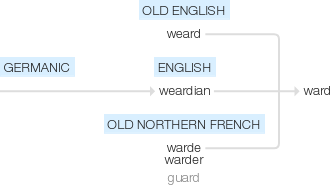Ward
Old English weard (in ward (sense 5 of the noun), also ‘body of guards’), weardian ‘keep safe, guard’, of Germanic origin; reinforced in Middle English by Old Northern French warde (noun), warder (verb) ‘guard’.
wiktionary
From Middle English ward, from Old English weard(“keeper, watchman, guard, guardian, protector; lord, king; possessor”), from Proto-Germanic *warduz(“guard, keeper”), from Proto-Indo-European *wer-(“to heed, defend”). Cognate with German Wart.
From Middle English ward, warde, from Old English weard(“watching, ward, protection, guardianship; advance post; waiting for, lurking, ambuscade”), from Proto-Germanic *wardō(“protection, attention, keeping”), an extension of the stem *wara-(“attentive”) (English wary, beware), from Proto-Indo-European *wer-(“to cover”). Cognate with German Warte(“watchtower”), warten(“wait for”); English guard is a parallel form which came via Old French.
From Middle English warden, from Old English weardian(“to watch, guard, keep, protect, preserve; hold, possess, occupy, inhabit; rule, govern”), from Proto-West Germanic *wardēn, from Proto-Germanic *wardōną, *wardāną(“to guard”), from Proto-Indo-European *wer-(“to heed, defend”).
etymonline
ward (n.)
Old English weard "a guarding, protection; watchman, sentry, keeper," from Proto-Germanic *wardaz "guard" (source also of Old Saxon ward, Old Norse vörðr, Old High German wart), from PIE *war-o-, suffixed form of root *wer- (3) "perceive, watch out for."
Used for administrative districts (at first in the sense of guardianship) from late 14c.; of hospital divisions from 1749. Meaning "minor under control of a guardian" is from early 15c. Ward-heeler is 1890, from heeler "loafer, one on the lookout for shady work" (1870s).
ward (v.)
Old English weardian "to keep guard, watch, protect, preserve," from Proto-Germanic *wardon "to guard" (source also of Old Saxon wardon, Old Norse varða "to guard," Old Frisian wardia, Middle Dutch waerden "to take care of," Old High German warten "to guard, look out for, expect," German warten "to wait, wait on, nurse, tend"), from PIE *war-o-, suffixed form of root *wer- (3) "perceive, watch out for."
French garder, Italian guardare, Spanish guardar are Germanic loan-words. Meaning "to parry, to fend off" (now usually with off) is recorded from 1570s. Related: Warded; warding.
